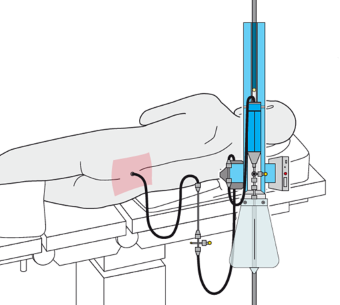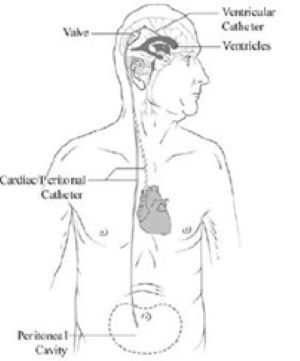This information is for patients referred to the the Adult Hydrocephalus team at North Bristol NHS Trust as a brain scan has shown features of Normal-Pressure Hydrocephalus.
What is Normal-Pressure Hydrocephalus (NPH)?
Cerebrospinal Fluid (CSF) is produced continually in the ventricles (cavities of the brain). Normally CSF circulates through the brain acting as a protective cushion and providing nutrients. NPH affects people aged over 60 and happens when the fluid becomes poorly absorbed, causing an abnormal amount of CSF to build up in the ventricles. This does not cause high pressure in the brain, but it does affect its function, and a person’s quality of life.
What are the symptoms?
Mobility and balance
- Difficulty taking large steps, and shuffling when walking.
- Unable to turn quickly due to losing balance.
- Falling backwards, sometimes when getting out of a chair.
- A general feeling of unsteadiness when walking.
Memory and thinking
- Slowness in thinking, and problems with attention.
- Memory difficulties.
- Changes in behaviour, loss of motivation.
- Worsening mood, depression, and anxiety.
Urinary incontinence
- Increased urgency to pass urine (go to the toilet).
- Sudden leakage of urine.
- Not making it to the toilet in time.
Why am I being referred to the Adult Hydrocephalus team?
You were referred by a specialist doctor or GP following a brain scan which may have shown features of NPH. We are a team of skilled nurses, doctors, advanced clinical practitioners, physiotherapists, and neuropsychologists. We will do multiple assessments (walking and memory tests) to see if you would benefit from further assessment and treatment by our team.
Physiotherapy-led prehab service
Before being seen in the Hydrocephalus Clinic, we offer patients the opportunity to discuss the diagnosis with a Specialist Physiotherapist. We will phone you once your referral has been accepted and can advise you on lifestyle choices you can make to optimise your health while waiting for your face-to-face review.
If you feel you need further advice, you can phone the hydrocephalus advice line on 0117 414 6613. This is for non-urgent queries.
How is it diagnosed?
You have been directed to this page as we suspect you have NPH but the diagnosis has not been confirmed.
NPH is a clinical diagnosis that cannot be confirmed with brain imaging (scans) alone. We need to do other tests to confirm the diagnosis.
Lumbar drain
A lumbar drain is a procedure that allows us to see if your symptoms are improved by temporarily removing cerebrospinal fluid (CSF) from your brain.
The lumbar drain is a piece of flexible tubing that is inserted into the lower part of the spinal canal. The tubing is connected to a drain which allows us to control how much CSF is drained. If you benefit from the drain, you may be considered for a permanent shunt.
Not everyone is suitable for a lumbar drain, we will review your brain imaging, and if this is the case we will discuss alternative options with you.

CSF shunting
A tube is inserted that diverts fluid from the ventricles of the brain to the abdomen through a small valve. This is connected to another tube passed under the skin to the abdomen. This valve can be adjusted to control the flow of the fluid from your brain.
We will the reassess your symptoms through various tests to confirm if the procedure has been beneficial. At this stage we will be able to confirm the NPH diagnosis.

Follow-up
If you do have a CSF shunt inserted you will be followed up regularly to assess your progress and make sure your symptoms are improved.
During these appointments we complete walking and memory tests to monitor for changes in your symptoms.
What can I do whilst on the waiting list for assessment?
Due to the symptoms of NPH, you may find it more challenging to do your day-to-day activities such as going to the shops, going on walk, engaging in hobbies, and social activities. However there are certain things you can do to help maintain your physical health during this time.
Physical activity
NPH can make walking much more challenging, however continuing to move is extremely important. Like many things in life if you don’t use it, you can lose it.
Going for a walk a few times a week is an excellent way to keep yourself fit and strong. If you like to do more structured exercise like exercise classes, then this is also encouraged.
Practical tips: going for a daily walk of 20-30 minutes will make sure you meet the government guidelines for weekly activity. If you are very unsteady, you may find it helpful to use a walking aid such as a walking stick or 4 wheeled walker.
You can speak to your GP about referral to a Community Physiotherapist to provide advice and guidance about maintaining your fitness and reducing your risk of falls.
Occupational therapists can give expert advice and provide equipment to ensure you are able to complete your everyday tasks, speak to your GP about getting referred.
Incontinence
It can be challenging to live with the urinary symptoms of NPH without advice and guidance. Speaking to your GP about referral to incontinence services can be a useful way to get professional advice on how to maintain your quality of life with these symptoms.
Practical tips: keep access to the toilet clutter free and remove any trip hazards to prevent risk of falling if you need to hurry. Consider a commode or urine bottle in your bedroom to use at night.
Memory and cognitive impairment
This type of hydrocephalus can change your brain’s ability to stay focus, remain organised, and can affect your memory. These symptoms can develop relatively quickly compared to other forms of dementia - over just a few months.
Practical tips: speaking to your GP/pharmacist about medication tools such a dosette box can prevent medication errors. Diaries and calendars be useful for keeping track of appointments and routines, as well as whiteboards for writing lists and reminders.
Family and friends
We recommend including your family and friends in this process, showing them this page may help them understand the condition and how the symptoms affect your life.
If you have any further questions or concerns at any stage in the process, please contact the Adult Hydrocephalus team on the details below. If it is out of hours, please contact your GP or local Emergency Department.
How to contact us
24 hour answer machine available
Monday - Friday
08:00 - 16:00
Adult Hydrocephalus Team
- Mr Richard Edwards
- Kelly Wride
- Cecily King
- Katie Holdsworth
- Jacob Spong
© North Bristol NHS Trust. This edition published November 2024. Review due November 2027. NBT003702
Support your local hospital charity

See the impact we make across our hospitals and how you can be a part of it.
